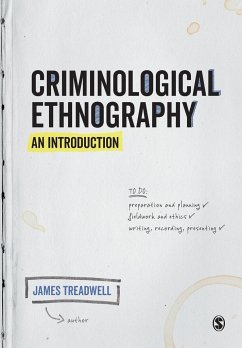"Written by one of the best Criminological Ethnographers in the business, this text will serve as an invaluable and insightful resource for both novice and seasoned ethnographers of criminological issues." - Anthony Ellis, University of Salford
In the first textbook to cover ethnography specific to criminology, James Treadwell guides readers through the ethnographic
research process in full, starting with a background to criminological ethnography, through planning and doing an ethnographic project, and finally, the writing up and reporting stage.
The book provides guidance for navigating key issues in ethnography, including access and researcher safety, and supports readers when carrying out their project with helpful exercises, questions and checklists. It also includes insightful case studies comprised of classic works and the author's own ethnographic projects, along with a range of extra learning features including key terms, a glossary, and further reading suggestions.
A valuable resource for anyone embarking on ethnographic research in criminology for the first time.
In the first textbook to cover ethnography specific to criminology, James Treadwell guides readers through the ethnographic
research process in full, starting with a background to criminological ethnography, through planning and doing an ethnographic project, and finally, the writing up and reporting stage.
The book provides guidance for navigating key issues in ethnography, including access and researcher safety, and supports readers when carrying out their project with helpful exercises, questions and checklists. It also includes insightful case studies comprised of classic works and the author's own ethnographic projects, along with a range of extra learning features including key terms, a glossary, and further reading suggestions.
A valuable resource for anyone embarking on ethnographic research in criminology for the first time.
At a time when quantitative approaches continue to be preferred in the analysis of 21st Century crime and its control, James Treadwell makes a timely and compelling case for the continuing relevance and explanatory power of Criminological Ethnography . Written by one of the best Criminological Ethnographers in the business, this text reinvigorates the debate over the role of ethnography in the study of crime and criminal justice and will serve as an invaluable and insightful resource for both novice and seasoned ethnographers of criminological issues. Anthony Ellis, Lecturer in Sociology and Criminology, University of Salford

